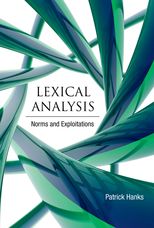 Lexical Analysis: Norms and Exploitations
Lexical Analysis: Norms and Exploitations
Published online:
22 August 2013
Published in print:
25 January 2013
Online ISBN:
9780262312851
Print ISBN:
9780262018579
Contents
-
-
-
-
-
-
-
-
-
-
-
-
-
-
-
12.1 Theoretical Streams in Linguistics 12.1 Theoretical Streams in Linguistics
-
12.2 The Lexicon in European Structuralism 12.2 The Lexicon in European Structuralism
-
12.2.1 Wilhelm von Humboldt’s “Infinite Uses of Finite Means” 12.2.1 Wilhelm von Humboldt’s “Infinite Uses of Finite Means”
-
12.2.2 Saussure’s Dichotomies 12.2.2 Saussure’s Dichotomies
-
12.2.3 Semantic Field Theory 12.2.3 Semantic Field Theory
-
-
12.3 The Russian Tradition 12.3 The Russian Tradition
-
12.3.1 Apresjan’s ‘Systematic Lexicography’ 12.3.1 Apresjan’s ‘Systematic Lexicography’
-
12.3.2 Mel’čuk’s Meaning-Text Theory 12.3.2 Mel’čuk’s Meaning-Text Theory
-
-
12.4 The Lexicon in Generative Linguistics 12.4 The Lexicon in Generative Linguistics
-
12.4.1 Chomsky: Subcategorization Rules and the Projection Principle 12.4.1 Chomsky: Subcategorization Rules and the Projection Principle
-
12.4.2 Jackendoff: Modules and Interfaces 12.4.2 Jackendoff: Modules and Interfaces
-
12.4.3 Meyer’s Attempt to Reconcile Generative Grammar and Corpus Linguistics 12.4.3 Meyer’s Attempt to Reconcile Generative Grammar and Corpus Linguistics
-
12.4.4 Bresnan: Lexical-Functional Grammar 12.4.4 Bresnan: Lexical-Functional Grammar
-
-
12.5 Pustejovsky’s Generative Lexicon 12.5 Pustejovsky’s Generative Lexicon
-
12.6 The Lexicon in Cognitive Linguistics 12.6 The Lexicon in Cognitive Linguistics
-
12.7 Fillmore: Frame Semantics and FrameNet 12.7 Fillmore: Frame Semantics and FrameNet
-
12.8 Construction Grammar 12.8 Construction Grammar
-
12.9 The Firthian Tradition 12.9 The Firthian Tradition
-
12.9.1 J. R. Firth 12.9.1 J. R. Firth
-
12.9.2 Halliday 12.9.2 Halliday
-
12.9.2.1 The Rank Scale 12.9.2.1 The Rank Scale
-
12.9.2.2 Exponence 12.9.2.2 Exponence
-
12.9.2.3 Delicacy 12.9.2.3 Delicacy
-
12.9.2.4 Cohesion 12.9.2.4 Cohesion
-
-
12.9.3 Sinclair and After 12.9.3 Sinclair and After
-
-
12.10 Conclusion 12.10 Conclusion
-
12.11 Summary 12.11 Summary
-
-
-
-
Chapter
12 The Role of the Lexicon in Linguistic Theory
Get access-
Published:January 2013
Cite
Hanks, Patrick, 'The Role of the Lexicon in Linguistic Theory', Lexical Analysis: Norms and Exploitations (Cambridge, MA , 2013; online edn, MIT Press Scholarship Online, 22 Aug. 2013), https://doi.org/10.7551/mitpress/9780262018579.003.0012, accessed 13 May 2025.
Abstract
This chapter examines the theory of norms and exploitations in the context of other theories of language. It considers the role of the lexicon in linguistic theory in twentieth-century Europe since Wilhelm von Humboldt and Ferdinand de Saussure, and also discusses generative linguistics, cognitive linguistics, frame semantics, and construction grammar. Moreover, the chapter looks at the Firthian tradition that paved the way for the newly emerging science of corpus-driven empirical linguistics and lexicology, as well as electronic lexicography.
You do not currently have access to this chapter.
Sign in
Personal account
- Sign in with email/username & password
- Get email alerts
- Save searches
- Purchase content
- Activate your purchase/trial code
- Add your ORCID iD
Purchase
Our books are available by subscription or purchase to libraries and institutions.
Purchasing informationMetrics
View Metrics
Metrics
Total Views
6
6
Pageviews
0
PDF Downloads
Since 7/1/2023
| Month: | Total Views: |
|---|---|
| July 2023 | 2 |
| February 2024 | 1 |
| March 2024 | 1 |
| August 2024 | 2 |
Citations
More from Oxford Academic



Get help with access
Institutional access
Access to content on Oxford Academic is often provided through institutional subscriptions and purchases. If you are a member of an institution with an active account, you may be able to access content in one of the following ways:
IP based access
Typically, access is provided across an institutional network to a range of IP addresses. This authentication occurs automatically, and it is not possible to sign out of an IP authenticated account.
Sign in through your institution
Choose this option to get remote access when outside your institution. Shibboleth/Open Athens technology is used to provide single sign-on between your institution’s website and Oxford Academic.
If your institution is not listed or you cannot sign in to your institution’s website, please contact your librarian or administrator.
Sign in with a library card
Enter your library card number to sign in. If you cannot sign in, please contact your librarian.
Society Members
Society member access to a journal is achieved in one of the following ways:
Sign in through society site
Many societies offer single sign-on between the society website and Oxford Academic. If you see ‘Sign in through society site’ in the sign in pane within a journal:
If you do not have a society account or have forgotten your username or password, please contact your society.
Sign in using a personal account
Some societies use Oxford Academic personal accounts to provide access to their members. See below.
Personal account
A personal account can be used to get email alerts, save searches, purchase content, and activate subscriptions.
Some societies use Oxford Academic personal accounts to provide access to their members.
Viewing your signed in accounts
Click the account icon in the top right to:
Signed in but can't access content
Oxford Academic is home to a wide variety of products. The institutional subscription may not cover the content that you are trying to access. If you believe you should have access to that content, please contact your librarian.
Institutional account management
For librarians and administrators, your personal account also provides access to institutional account management. Here you will find options to view and activate subscriptions, manage institutional settings and access options, access usage statistics, and more.